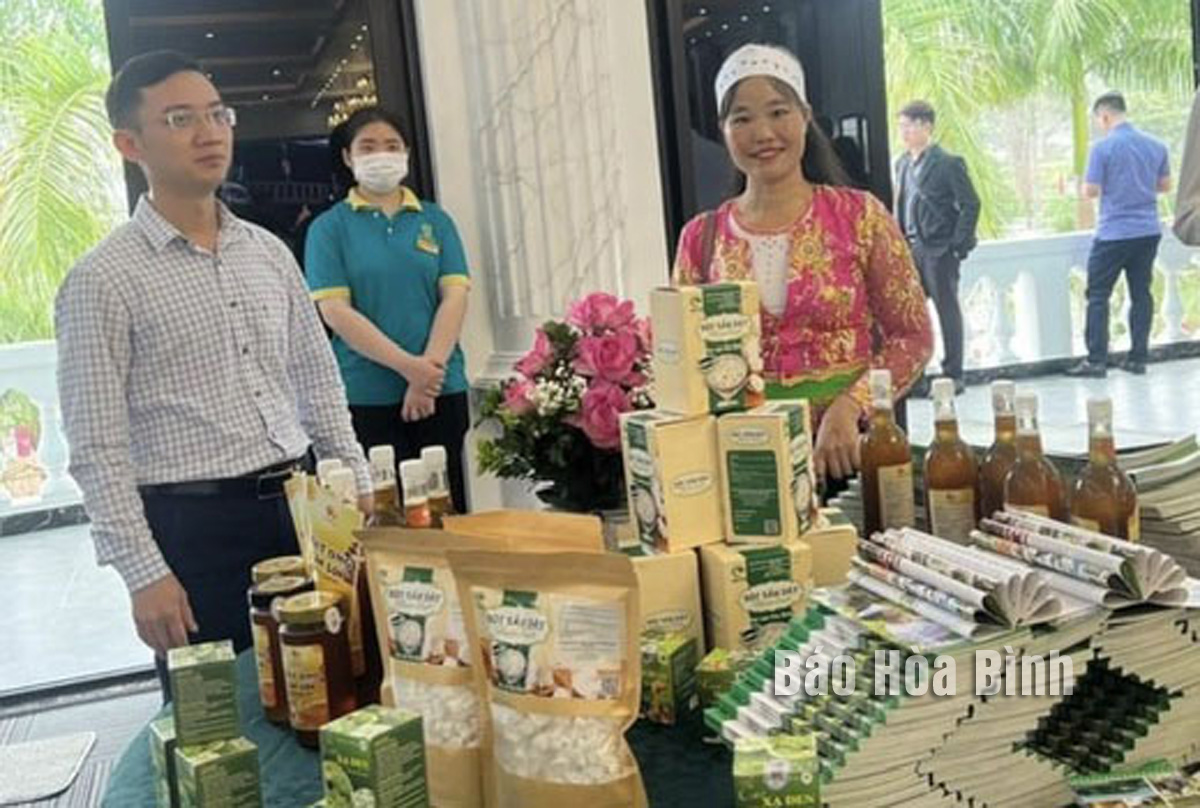
Capitalising on the health benefits of cassava starch and its large plantation, the Nhuan Trach agricultural service and cassava starch processing cooperative in Dong Se hamlet, Nhuan Trach commune, Luong Son district, has successfully developed a product that meet the One Commune One Product (OCOP)’s 3-star standard.

The Nhuan Trach cooperative’s cassava starch product has been
introduced by Luong Son district at many events in and outside the province.
Hoang Trong Thu, director of the cooperative,
has been involved in cassava starch production for over a decade. According to
him, starting from the commune’s crop cultivation restructuring policy, many
households in Dong Se have been cultivating high-yield cassava for years. Due
to its suitability to local soil and climate, the plant achieves high
productivity, with the hamlet alone bringing dozens of tonnes of cassava
products to the market annually. However, due to dependence on informal trade,
there were times when cassava prices dropped significantly, causing
difficulties for many households in the sale of the product.
"My family cultivates over 1 hectare of
high-yield cassava, so there are also times when we face heavy price-related
pressure. To rescue our own plantation and support local farmers, my family
decided to learn how to process cassava starch,” Thu said.
In the early days, Thu completely processed the
product manually. After many years of perseverance, his family and eight others
specialising in cassava cultivation established the cooperative to standardise
farming works according to VietGap, ensuring the quality of inputs. Simultaneously,
they invested in a machinery system, thereby building a closed production
process to ensure food safety. By now, the cooperative has developed a raw
material area ofover 8ha, turning out an average of 5-6 tonnes of starch
each year.
Thu stressed that all processes from input to
packaging follow food safety standards.
In September this year, the Luong Son People's
Committee classified the cooperative’s product as meeting the 3-star OCOP
certification.
According to data from the Hoa Binh Provincial Party Committee, the industrial production index for the first six months of 2025 is estimated to have increased by 20% compared to the same period last year. This marks the highest year-on-year growth rate for this period since 2020.
In the first six months of 2025, Hoa Binh province’s export turnover was estimated at 1.145 billion USD, marking an 18.11% increase compared to the same period in 2024. Import turnover was estimated at $ 804 million, a 17.15% increase, which helped the province maintain a positive trade balance.
The lives of the ethnic minority farmers in Tan Lac district have gradually improved thanks to the new directions in agricultural production. This is a testament to the collective strength fostered through the professional associations and groups implemented by various levels of the district’s Farmers’ Union.
With the motto the "product quality comes first,” after nearly one year of establishment and operation, Muong village’s Clean Food Agricultural and Commercial Cooperative, located in Cau Hamlet, Hung Son Commune (Kim Boi district), has launched reputable, high-quality agricultural products to the market that are well-received by consumers. The products such as Muong village’s pork sausage, salt-cured chicken, and salt-cured pork hocks have gradually carved out a place in the market and they are on the path to obtaining the OCOP certification.
In the past, the phrase "bumper harvest, rock-bottom prices" was a familiar refrain for Vietnamese farmers engaged in fragmented, small-scale agriculture. But today, a new spirit is emerging across rural areas of Hoa Binh province - one of collaboration, organisation, and collective economic models that provide a stable foundation for production.
Maintaining growing area codes and packing facility codes in accordance with regulations is a mandatory requirement for agricultural products to be eligible for export. Recently, the Department of Agriculture and Environment of Hoa Binh province has intensified technical supervision of designated farming areas and packing facilities to safeguard the "green passport" that enables its products to access international markets.



